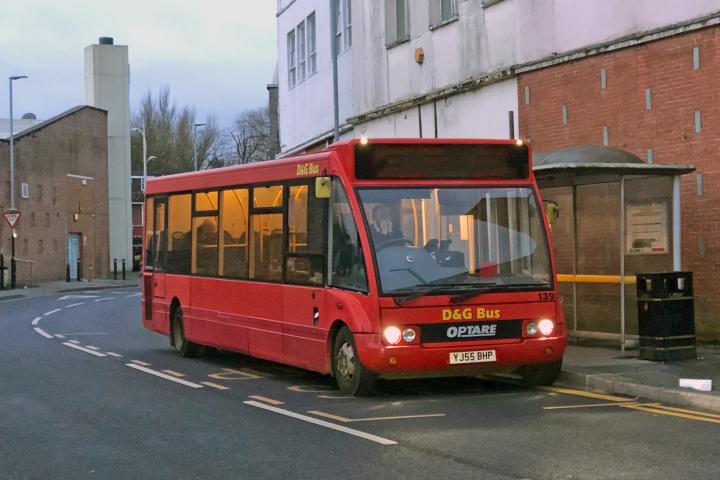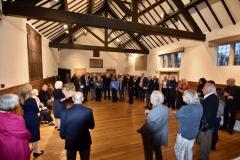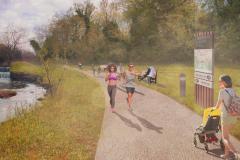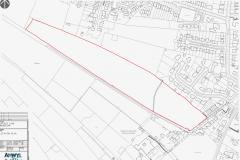
Cheshire East Council has announced that it will be supplementing a new commercial bus service which launches towards the end of the month.
Following Arriva North West's withdrawal from running the 130 bus between Macclesfield and East Didsbury, via Alderley Edge, Wilmslow and Handforth, for commercial reasons a new operator stepped in to run a reduced service.
From Monday 27th January, D&G Bus will operate the new hourly service on Monday to Friday, from Macclesfield to Handforth only, via Alderley Edge and Wilmslow. It will not continue to East Didsbury.
Initially it was not going to operate on Saturdays but the Council has confirmed that it will be subsidising an hourly service on Saturdays, starting from 1st February. The Saturday service, like the weekday service, will run from Macclesfield to Handforth (via Alderley Edge and Wilmslow) and back to Macclesfield.
Councillor Craig Browne, the council's deputy leader, said: "The rationale for council intervention to ensure a Saturday service is in line with our stated intention to reduce the environmental impact of car journeys, whilst supporting the weekend economies of principal towns along the route and ensuring that vulnerable and elderly residents are able to access healthcare at Macclesfield Hospital more easily.
"A small number of residents have asked why the service will now terminate at Handforth rather than at East Didsbury as it currently does; however, an analysis of existing passenger journeys has shown that 75% of journeys on the 130 are wholly within Cheshire East, whilst a further 9% are wholly within Greater Manchester. It logically follows that only 16% of passengers are using the 130 for cross-border journeys, which is insufficient to justify a public subsidy to the service."
He added "Vulnerable residents who are adversely affected by the change in this commercial operation, may be able to use the council's newly launched flexilink service as an alternative."







Comments
Here's what readers have had to say so far. Why not add your thoughts below.
Support the Timetable and Route
Use it or Lose it!
Casual interest; how much will this subsidy/intervention cost?
The cost should come from an increase in road tax and local parking levies.
In this way we might finally start to shift critical mass away from cars and, in doing so, improve town-centres and (most importantly) reduce CO2.
Just look at London, cost to the tax payer is too high. Fares are not cheap, the equivalent journey of Alderley to Manchester would be capped at around £12 per day in London, and that's with tax payer support! Even with a congestion charge it has not brought down car use, in fact it has gone up since it was introduced. Use subsidies for social transport needs like this.
Regards the FOI, the council will not supply one on a per route/ service basis due to commercial sensitivity, but will provide an over all "we spent xxx on transport subsidies" The subsidies generally follow one of two processes, the council agree a minimum subsidy to provide the service as agreed with the operator and the operator keeps all revenue on top of the min subsidy, this is generally better value for money for the council or they agree to what is known as Minimum cost, so the council and operator will agree a full fee that the operator needs and the council will take all bus revenues but the risk on this is with the council not the operator. I don't know what deal CEC would have with an operator and again they wouldn't say due to commercial sensitivities.
All that you say is true and representative of current thinking. However, we will be forced - hopefully soon - to take drastic action to reduce carbon emissions and significant impact can be gained from completely re-thinking the way we move people around.
you're suggesting this can be paid for by increasing the Road Fund Licence Tax and extra Parking Levies ?
The car owner already pays huge extra taxes for using their car, such as the Road Fund Licence Tax, massive taxes on petrol, on insurance, on car repairs, on the MOT, etc, with the VAT added onto all these taxes, making it yet another tax on the tax ?
No No No …… the motorist has already been hit hard enough.
In fact, the huge revenue collected from each Road Fund Licence throughout the country is already used for many other Government projects, with only a very small percentage used to improve our roads.
I accept what you're saying and agree that the motorist is already paying far too much tax, particularly when you consider what we get in return - potholed roads, motorways reduced to 50mph (or less) for years, congestion, nowhere to park etc etc etc.
However, the reason that the Govt can tax us with impunity is because there is absolutely no viable alternative. Bus and train services have been cut to a level whereby it is nigh on impossible to plan reliable, cost-effective travel. If you are brave enough to chance it, the likelihood is the bus or train will travel from / to points that are some distance from your actual intended starting and finishing points, may well be dated and grimy, and you may be subjected to varying degrees of antisocial behavior
With increasing awareness of Climate Change will come a realisation that transport has to change radically.
The Govt is signed-up to ban fossil-fuelled cars by 2040 and this is likely to be brought forward to 2035 or even 2030. So, within the next 10 - 15 years there will have to be a massive improvement in battery technology and / or a monumental investment in infrastructure (how do we charge the millions of cars that park overnight on streets?)
Of course the fossil-fuel ban doesnt take into account the increasingly potent evidence that the particulates from tyres and braking systems are harmful.
Anyway, if we suppose that our road / fuel taxes are already fully allocated, we have to expect that we will have to pay more - somehow.
It just seems to me that any significant investment should be made in better public transport systems as opposed to facilitating the unchecked increase in cars and the associated problems that they bring.
Roads, like the NHS, Police, Education etc are funded out of general taxation, so we all pay for them whether we have a motor vehicle or not.
With the Earth facing catastrophic climate change as far as human habitation is concerned, and scientific opinion being that this is a least partly driven by human activity, governments can be expected to use the tax system to reduce carbon emissions by discouraging car use and encouraging use of public transport. This requires that a viable public transport system is in place, which includes the provision of a local bus service.
IF the government puts its (our!) money where its mouth is on climate change, expect higher taxation on internal combustion-engined cars together with more public spending on provision of a viable bus and train services. But that is, of course, a big 'IF'!
https://www.whatdotheyknow.com/request/cost_of_subsidy_for_saturday_130